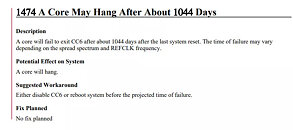AMD recently published an errata for their second generation EPYC processors based on Zen 2 which states that, "A core will fail to exit CC6 after about 1044 days after the last system reset." 1044 days is roughly 34 months, or just shy of 3 years of total uptime, and is actually an over estimate according to some sysadmin sleuths on Reddit and Twitter that did the math and discovered the actual time is 1042 days and 12 hours. The problem occurs because the CPU REFCLK counts 10ns ticks in a 54-bit signed integer, and if you count just over 9 quadrillion of these ticks you get the resulting overflow at 1042.4999 days. Once this overflow occurs the cores are stuck forever in a zombie state, and will not take any external interrupt requests. Well, forever until you flip the power switch off and back on again, which will reset the counter.
It's certainly impressive that this problem was discovered at all, as it suggests that more than a single system has been running for almost three years straight without a single restart. Though this does put EPYC "Rome" out of the running for any possible awards for longest running systems, it may serve as a reminder to initiate system updates or patches for other vulnerabilities that have been discovered in the four years since that generation of processor were first launched. AMD does not plan to issue any fix for the CC6 bug, instead recommending that administrators disable CC6 to avoid the cores entering the zombified state, or simply initiating a restart every once in awhile before the time limit expires.


View at TechPowerUp Main Site | Source
It's certainly impressive that this problem was discovered at all, as it suggests that more than a single system has been running for almost three years straight without a single restart. Though this does put EPYC "Rome" out of the running for any possible awards for longest running systems, it may serve as a reminder to initiate system updates or patches for other vulnerabilities that have been discovered in the four years since that generation of processor were first launched. AMD does not plan to issue any fix for the CC6 bug, instead recommending that administrators disable CC6 to avoid the cores entering the zombified state, or simply initiating a restart every once in awhile before the time limit expires.


View at TechPowerUp Main Site | Source









 :
: